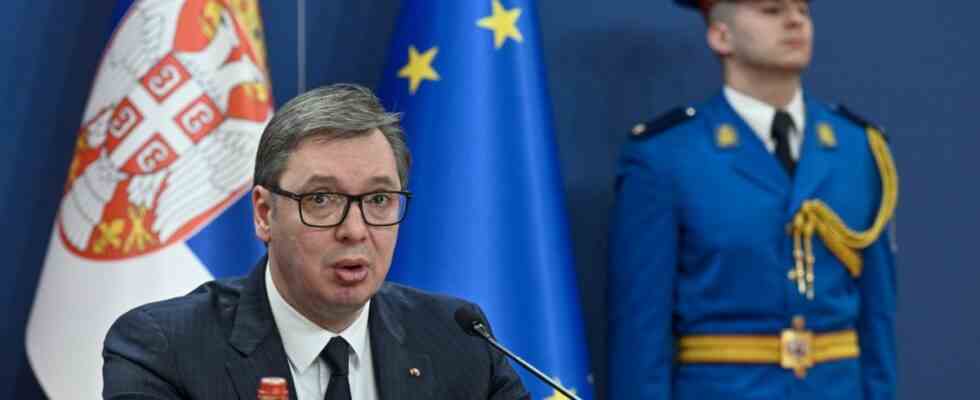On Thursday, the swing swung west again. Aleksandar Vučić, President of Serbia, who is known for his “seesaw policy” between the US, EU, Russia and China, urged the Belgrade parliament to advocate his course of keeping the country on the “European path”. This is of “central interest” for the nation: It is about “investments, the standard of living, pensions and salaries”. Meanwhile, members of parliament from various opposition parties bombarded him with accusations, it became loud in the hall, some held up banners with slogans such as “No to capitulation” and “treason” in front of the president.
The dispute was triggered by efforts by Brussels and Washington to persuade Serbia and its former province of Kosovo, which declared itself a sovereign state in 2008, to “normalize” their mutual relations. A key role is played by a draft submitted by France and Germany, which is said to be based on the German-German basic treaty of 1972: similar to what happened in the FRG and GDR, Serbia and Kosovo should mutually assure each other that they will respect each other’s territorial integrity and not in hindering their respective development. A formal recognition of Kosovo’s independence, such as that refused by Serbia and five EU member states, would be excluded.
“Go back to school”
The Franco-German draft has been haunting the region as an open secret since September last year. There is no publicly available version, but most of those involved have already made public statements about it, including Serbian President Vučić on Thursday in the Belgrade parliament. “Go back to school and learn what a non-paper is,” he raged at the raging opposition MPs, who accused him of being secretive. And then he spoke quite openly about the confidential paper, specifically “Point Four”, which states: Serbia will not oppose Kosovo’s membership in any international organization. “Unthinkable,” Vučić conceded that Kosovo would be allowed to join the United Nations or NATO, for example. So far he has “signed nothing, initialed nothing” and will continue talks with the international negotiators.
Vučić then referred to the “pressure” that the EU and the US were exerting on his government; they threatened to stop investments and block the EU accession process for Serbia if they did not agree to the normalization process with Kosovo and did not join the European sanctions against Russia. Yes, there are “painful” concessions that Brussels and Washington are demanding. In the end, Vučić was back to being the see-saw politician he is known to be: In his dealings with Western negotiators, he can point to the tremendous resistance in his own country that prevents him from pursuing a more resolute European course – and in his own country he points to that enormous pressure from the EU and the USA, which he would sooner or later have to give in to, albeit very, very reluctantly.
Increasing impatience with Kosovo’s prime minister
In the meantime, impatience is spreading in Brussels and Washington, not only in view of the maneuvering on the Serbian side, but increasingly also with Kosovo’s Prime Minister Albin Kurti: For a long time he has refused to agree to the formation of an association of Serbian communities in the north of the country – although it was ten years ago years ago the then Kosovar government had committed to this in an agreement concluded in Brussels with Serbia. Gabriel Escobar, the US special envoy to the Western Balkans, and Derek Chollet, undersecretary at the US State Department, cried out in a joint statement last week Explanation the government in Pristina to give up opposition to the formation of such a community association: “Kosovo’s closest friend and ally” believes that this is an essential step towards a “rightful future” as a “sovereign, multi-ethnic and independent country , embedded in Euro-Atlantic structures”.
Kurti had repeatedly justified his resistance by referring to the Republika Srpska, the Serbian sub-state of Bosnia-Herzegovina, whose leadership, with Moscow support, regularly undermines and blocks the functioning of the entire state. The two US envoys made it clear in their statement that they are by no means striving for such a construct; rather, they are asking Pristina to present its own “vision” for such an association.
On Thursday, Kurti actually indicated a little movement in the question. In a speech to the parliament in Pristina, he said that one could “consider” the formation of a municipal association if a number of conditions were met: For example, it should not have any executive powers and only act strictly within the framework of the Kosovar constitution. And finally: First, the “mutual recognition” of both countries must be implemented. Precisely the central, sensitive point that the Franco-German initiative wants to deliberately ignore.

